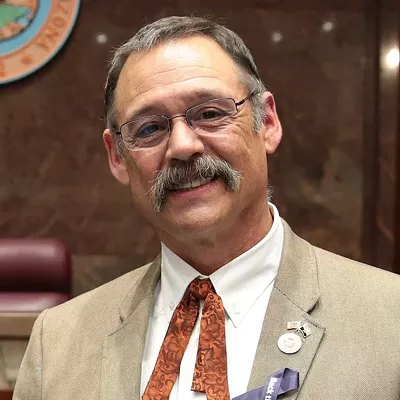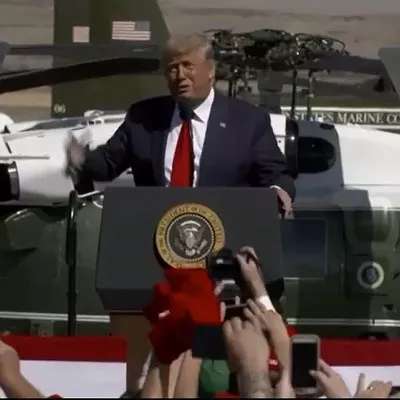Now the Democrats, led by former Mayor Tom Volgy, want to take it back.
Despite the Democrats' 3-2 voter registration advantage, toppling Walkup won't be easy. The former Raytheon (nee Hughes) executive enjoys popular support--local opinion polls consistently rate him as one of Pima County's most popular politicians--and he's cautiously governed from the center since taking office.
But if anyone on the Democratic bench has a shot at bringing down Walkup, it's Volgy, who has deep roots in city politics. He served for a decade in the midtown Ward 6 council seat before successfully winning the mayor's office in 1987. After one term atop City Hall, he stepped down in 1991 to unsuccessfully pursue a congressional seat. His last foray on the campaign trail was in 1998, when he gave U.S. Rep. Jim Kolbe his tightest challenge since 1984, losing by 7 percentage points.
A professor in the UA's political science department, Volgy has spent much of his time out of office traveling through the former Soviet Union, helping fledgling democracies establish new political systems.
Volgy credits a passion for local politics for drawing him back into the ring.
"I've gone full circle on this," he says. "I'm no longer naïve enough to believe I can alter national policies, but I think that I can continue to have a significant impact on my own community."
There's certainly no shortage of challenges within the city limits. The transportation system continues to deteriorate. Downtown's Rio Nuevo revitalization shows few signs of life. Wages remain low and good jobs scarce. Old leaking landfills must be cleaned up. The homicide rate remains high. The social-service safety net has been frayed by budget cutbacks.
That budget crunch promises to be a major issue in the campaign. Walkup joined with fellow Republicans Kathleen Dunbar and Fred Ronstadt and Democrat Carol West (who is facing a primary challenge) to balance the budget with several controversial steps, including higher pool admissions, steeper fees for swimming lessons and the city's first garbage-collection fee.
The budget process forced Walkup to flip on his vow to not raise taxes as well. At the beginning of the year, he declared that a use tax (which applies a sales tax to catalogue sales and other major purchases made outside the city limits) was "off the table--I'm not even going to talk about it." But when it came time to adopt the budget earlier this year, Walkup cast the deciding vote to enact the use tax.
That was a minor embarrassment compared to the stunning defeat Walkup endured in May 2002, when voters rejected by a 2-to-1 margin his proposed solution to Tucson's transportation woes, a road-heavy plan funded by a half-cent sales tax.
He attempted to rebound in January with a new agenda: pushing for a consolidation of city and county government into one large metro government system and developing a regional transportation authority to handle the growing problem of congestion.
But metro government is hardly a new idea; local leaders have talked about it for decades, although they've made little headway on the concept. Volgy himself pushed it during his days in city politics and still believes it's a good idea, although he's not making it a centerpiece of his campaign.
Instead, Volgy's platform features five major planks: improving transportation, strengthening neighborhoods and social-support networks, increasing wages, boosting education and delivering better health care.
He's been talking about those issues for months at what he calls his "coffees"--meetings with small groups at homes across Tucson, where Volgy introduces himself, talks about the issues and raises money. He's already done more than 50 of these "coffees" and plans plenty more by the end of the campaign.
But identifying problems and finding solutions are two very different things. Volgy has sidestepped questions about how he would address these challenges, promising to deliver specifics in a series of press conferences next month.
Volgy concedes that issues like education and health care fall outside the typical civic arena. Perhaps most ambitious is talk about creating what he calls a health-care credit union, which would work as a kind of co-op HMO. Instead of paying premiums to an insurance company, people would instead contribute to a nonprofit organization that would be open to both the public and private sector.
"I take on an issue like health care, because I know it is killing us," Volgy says. "I wish I could change national policy. I can't. But I think I can change local policy."
AT A TIME WHEN CITY government is having trouble just paying the bills, voters might be reluctant to buy into such a radical political experiment.
But Volgy does have a record as a reformer. One of the earliest champions of public financing for political campaigns, he spearheaded an effort to get voters to approve a matching funds program in city elections. Under the system, any candidate who gets a minimum number of city residents to make a contribution of at least $10 can get a dollar-for-dollar match of any funds they raise, provided they agree to a spending threshold.
Although final limits will be adjusted for inflation in mid-July, the mayoral candidates will be able to spend up to roughly $164,500 this year. (Council candidates are limited to about $82,250). Both Walkup and Volgy should easily qualify for matching funds and raise the maximum amount. And both will be able to count on additional help from their respective political parties. Republicans have already proven that they know how to run a potent get-out-the-vote effort, having clobbered the Democrats in that effort two years ago. Despite being outnumbered in the city, Republicans have succeeded by targeting their supporters, particularly on the eastside, with expensive early-voting efforts.
Democrats, meanwhile, have always had trouble getting their supporters out the vote in low-profile city elections, particularly on the city's southside and westside, which are traditionally Democratic strongholds.
Pima County Democratic Party chairman Paul Eckerstrom, who took command in January, is promising a vital effort from his party this year.
"It's no secret what you need to do," says Eckerstrom. "You send them a piece of mail and you call them and you walk."
But there's another potential factor out there: independent campaign committees, which have helped Republican candidates in the last two election cycles. In 1999, an independent campaign committee, Tucsonans for Responsible Leadership, spent more than $50,000 for a series of ads targeting Democratic candidate Molly McKasson; in 2001, two committees, Citizens for a Better Tomorrow (backed by the development community) and Good Government for Arizona (a front for the Arizona Republican Party) spent a combined $124,000, with a large chunk dedicated to pounding Democratic City Council candidate Paula Aboud, who lost to Republican Kathleen Dunbar.
Volgy calls such independent campaigns a corruption of Tucson's campaign program and vows to demand that any such campaigns that support him shut down.
"That's not what the people of Tucson voted for," he says.
While Walkup was aided by the independent campaign committee last time out, the issue that swept him into office isn't even a blip on the radar screen this year: direct delivery of CAP water.
The disastrous introduction of CAP water in the early '90s--the water poured out of many faucets as brown sludge and blew up pipes--led voters to twice insist that CAP water be recharged into the aquifer before being pumped into homes. The contentious political debates dominated city campaigns in 1995 and 1997.
In 1999, recharge supporters tried another initiative which would have forced the city to recharge CAP water in local riverbeds rather than in the Avra Valley recharge basin designed by Tucson Water. McKasson supported the initiative; Walkup opposed it. Voters sank McKasson along with the more restrictive recharge proposal.
Without the water issue on the ballot, Walkup will have a tough job winning the hearts and minds of moderate Democrats. Volgy is already tapping into discontent with Republican plans at the state and federal level, complaining that both jurisdictions have abandoned municipalities.
"We're all alone," says Volgy. "There is no urban policy at the federal level, and there is no urban policy at the state level, if there ever was."
On the stump, Volgy puts the choice in stark terms.
"Tucson is at a crossroads," he says. "We can either become a great city or a mediocre city. And time is running out to make the choices that will make us a great city."











